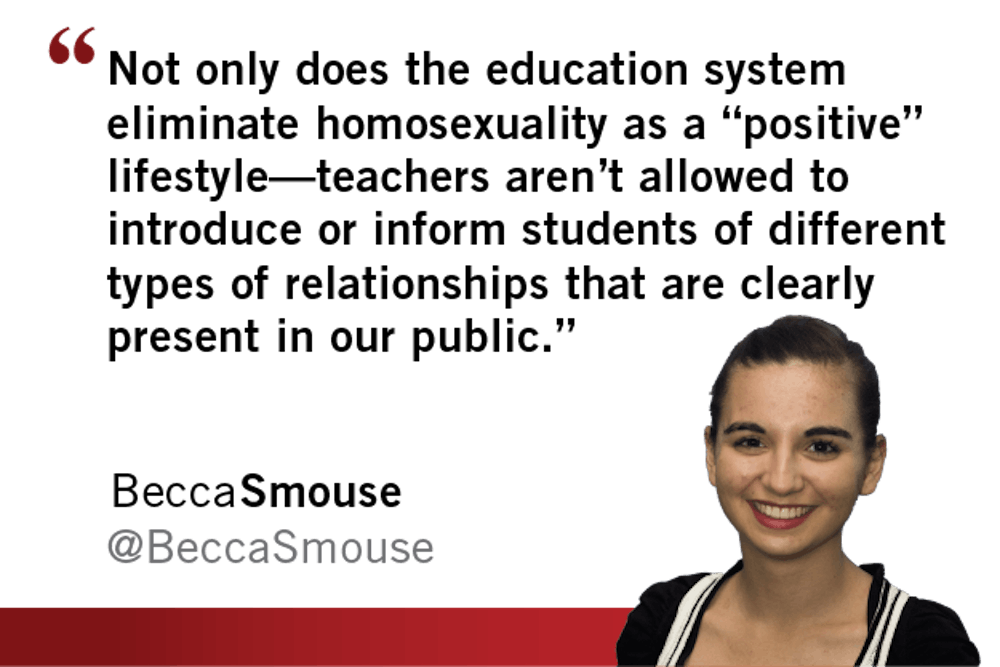Couples who have waited decades for the right to utter "I do” celebrated last week when a federal court finally repealed Arizona's gay marriage ban.
On paper, in writing, on social media, through photographs, the change has only been seen as a wave of positivity and acceptance for the public. Our red state is starting to bleed some blue.
But this excitement of a movement toward tolerance halted for me once I realized we as a state still have a huge problem: Primary schools in Arizona don’t teach, or even acknowledge sexualities other than heterosexual as acceptable, appropriate or suitable.
According to the Gay, Lesbian, Straight, Education Network, Arizona mandates that “no district shall include in its course of study instruction which … (1) promotes a homosexual life-style … (2) portrays homosexuality as a positive alternative life-style … (3) suggests that some methods of sex are safe methods of homosexual sex.”
 Teachers aren’t allowed to introduce or inform students of different types of relationships that are clearly present in our public.
Teachers aren’t allowed to introduce or inform students of different types of relationships that are clearly present in our public.
This begs the question: Is it the school’s place to inform children about sexuality? I say yes, 100 percent. But the subject must be handled carefully, accurately and sensitively.
Some fear this education will only confuse children or cause students to accusingly point fingers at classmates who might be gay.
“When homosexuality is presented to prepubescent children, they are told in class that if you like the same sex more than the opposite sex, you are homosexual,” the right-wing Center for Arizona Policy wrote on its website.
Our education could easily fall into this trap, especially when working with elementary-aged children. The solution lies in how we teach our children about sexuality, how we introduce it, how far we take the information and so on.
States have already begun using inclusive material in the classroom to simply introduce the idea of the LGBT community to young students. Books like "King and King" and "Daddy’s Roommate" present a story of two men being in love.
This allows kids who might have two moms or two dads to be included in early conversations about love and relationships. With this, the idea of same-sex couples won't seem so foreign to young people.
The curriculum can change for junior high and high school, where we are no longer just acknowledging diversity but talking about it. Discussions can stem from what different forms of sexuality mean, what the feelings are like, how to handle hormones and the tantalizing emotional confusion that comes with any type of sexuality.
We can take steps to eliminate the bold line between gay and straight people and plainly talk about feelings, desires and any other hard conversations from which schools shy away. That’s the next step toward tolerance and hopefully equality.
Sex, hormones and relationships have all been clumped into a topic we are fearful to talk about with young people. The Internet is only so helpful and often more harmful for searching eyes and timid hearts. And parents sometimes fail to be accepting.
GLSEN said Arizona, along with a handful of other states, operate under “no promo homo” laws by limiting our children’s education about LGBT issues. We are legally promo homo marriage now, so these laws are in dire need of a revamp.
While a curriculum won’t be created overnight, just like the right to marry wasn’t granted without a fight, the conversation needs to begin sooner rather than later. The law has taken a wondrous first step forward toward tolerance, now comes the need for a comprehensive education system.
Reach the columnist at rsmouse@asu.edu or follow her on Twitter @BeccaSmouse
Editor’s note: The opinions presented in this column are the author’s and do not imply any endorsement from The State Press or its editors.
Want to join the conversation? Send an email to opiniondesk.statepress@gmail.com. Keep letters under 300 words and be sure to include your university affiliation. Anonymity will not be granted.
Like The State Press on Facebook and follow @statepress on Twitter.




